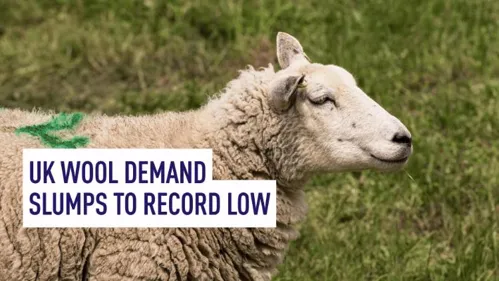UK Farmers Embrace Genetics Amid Plummeting Wool Demand

In a landscape reminiscent of pastoral life, UK farmers are confronted with a stark reality as wool demand continues to plummet. Once a thriving segment of the agricultural economy, the wool trade is now grappling with unprecedented declines. As a response, farmers are beginning to explore innovative genetic solutions that could redefine sheep farming.
The art of wool production faced significant challenges, leading some farmers to embrace science in an effort to stay competitive. In response to the changing market, a new breed of sheep, known as Exlana, which sheds wool naturally, has gained traction. This approach mirrors the natural molting process seen in dogs.
Exlana sheep, aptly named with a Latin nod meaning 'without wool,' are specifically developed for their unique attribute of self-shedding. Farmers typically incur costs of approximately 10 dollars per ewe for wool upkeep and shearing, a process that yields minimal financial return as wool prices now sit at mere cents. Consequently, the shift towards these innovative sheep breeds not only promises reduced maintenance costs but also enhances overall sustainability.
Peter Baber, a sheep breeder, articulates the potential transformation in sheep breeding: 'If you sit down with a blank sheet of paper and design the sheep of the future, it won't have wool.' This sentiment encapsulates the growing recognition among farmers that adapting to market realities necessitates radical changes in breeding practices.
Beyond economic aspects, the Exlana breed offers several welfare benefits that directly improve farmers' operations. With Exlana sheep, there is no longer a need for tail docking, nor the application of costly and uncomfortable chemical treatments that were historically used to protect sheep from fleece inflexibility.
Furthermore, Exlana sheep also display improvements in livestock management through their ability to give birth independently. This advancement alleviates the labor-heavy process of lambing, thus enhancing operational efficiency for farmers.
Bill Geen, a Devon sheep farmer, emphasizes the significance of this genetic progress, sharing his insights: 'They should be able to lamb on their own; the lambs need to be born easily, shake their head, jump up and start suckling the mother, and the mother has enough milk for two lambs.' Such traits could revolutionize traditional farming practices.
The realm of genetics within sheep farming has burgeoned into a lucrative sector. Organizations such as Breed for Change are now conducting research focused on methane emissions from sheep, allowing farmers to breed with those exhibiting lower emissions. This undertaking aligns with broader environmental goals to mitigate the carbon footprint of livestock.
Geneticist Janet Roden from Innovis highlights a critical aspect of modern agricultural practices, stating, 'When we look at some of the traits like methane or efficiency of things, we can't judge that just by looking at the animal. We need the data and the science to help us identify the animals that have got the best genetics.' This scientific approach is reshaping the landscape of sheep breeding.
Despite the advances, ethical questions surrounding genetic modification remain a topic of debate. Nevertheless, Sam Boon from the Agriculture and Horticulture Development Board points out that the relationship between science and farming is not a new development. He notes that selective breeding has been part of agricultural practices long before modern techniques were introduced.
With a history steeped in natural selection, the farming community stands at a crossroads. Boon refers back to Charles Darwin's observations on breeding diversity, reiterating that significant variations exist within sheep populations, enabling farmers to induce remarkable transformations through selective breeding. The ongoing changes inspire contemporary sheep farmers, who are reimagining the future of sheep husbandry amid tightening profit margins.
Read These Next

Largest Known Black Hole Discovered
Commentary on the discovery of the largest known black hole, exploring its significance and implications for astrophysics and our understanding of the universe.

China Innovates Deepwater Oil and Gas Extraction Model
China has launched the Haikui No. 1 and Haiji No. 2 for deepwater oil and gas extraction, boosting efficiency in the Pearl River Mouth Basin.

Autonomous Vehicles Revolutionizing Remote Logistics
The commentary discusses the recent integration of autonomous vehicles into the logistics sector in Tibet, emphasizing their technological advancements and practical applications.
